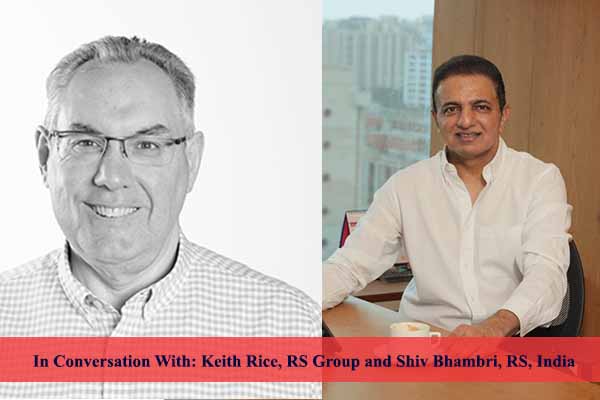Launched in 1937, RS is a global omni-channel provider of product and service solutions for designers, builders, and maintainers of industrial equipment and operations. With operations in 32 countries, the company offers more than 650,000 industrial and electronic products, sourced from over 2,500 leading suppliers, and provides a wide range of products including semiconductors, interconnect, passives and electromechanical, automation and control, electrical, test and measurement, tools and consumables etc. TimesTech Buzz interacted with Keith Rice, Vice President Emerging Markets, RS Group and Shiv Bhambri, Country Manager – RS, India to know about future of electronics industry, semiconductor shortage and much more.
Read the full interview here:
TimesTech: Tell us about the company, what are its key offerings and key features that set it apart from its competitors?
Shiv Bhambri: RS India is part of RS Group plc, a leading global omni-channel industrial product and service solutions provider to customers who are involved in designing, building and maintaining industrial equipment and operations, safely and sustainably. We stock more than 700,000 industrial and electronic products, sourced from over 2,500 leading suppliers, and provide a wide range of product and service solutions to over 1.2 million customers. With operations in 32 countries, we trade through multiple channels and ship over 60,000 parcels a day.
We support customers across the product life cycle, whether via innovation and technical support at the design phase, improving time to market and productivity at the build phase, or reducing purchasing costs and optimising inventory in the maintenance phase. We offer our customers tailored product and service propositions that are essential for the successful operation of their businesses and help them save time and money.
TimesTech: Talking about the future of the electronics industry, how do you see it going in the near future? What are some of the key technology areas that you expect to see a significant portion of the demand and why?
Shiv Bhambri: Electronics has a very strong outlook, showing considerable growth projections over the next 5-10 years of mid-single digit CAGR. I expect growth to be driven by green energy and low lower management, electrification in automotive and transport, 5G and continuous evolution of IOT measurement and information flow. The Industrial space around factory and home automation will continue to evolve. I expect to see sustainability become a critical element of technology development.
TimesTech: The shortage of semiconductor chips was a hot topic. Whether the supply eased now? What kind of pressure do distributors feel, and how do they manage it?
Shiv Bhambri: Supply shortages have not been fully resolved. There are many areas of semiconductor supply that continue to be constrained, high power discrete and analog products including sensors in addition to many microcontroller products all continuing to be under capacity constraint and restricted supply which will go well into 2023. That said, many areas of passive component supply are normalised and Interconnect and Electromechanical products whilst having some long leadtimes are certainly seeing an easing of leadtimes in terms of trend. I expect the continued evolution of leadtime trends to reduce but we will see some constraints continue into 2023.
The pressure continues to be focused on optimising availability of supply for our customers which means navigating through the many supply chain and leadtime challenges that remain. Supply won’t normalise across all products as the complexity of demand changes and supply chain challenges do not all have resolution.
TimesTech: How is the geopolitical situation affecting the supply chain of electronics components and do you see any disruption in the near term?
Keith Rice: I expect the geopolitical situation to continue to impact supply chain performance and ultimately availability consistency. There are a number of issues that make the complexity challenging, the global economic headwinds, Russia/Ukraine conflict and fallout, the China/West relationship and the changing landscape for companies revising their manufacturing strategies, the aftermath of Brexit and the UK/European logistics, and of course the increasing labour and raw material cost challenges resulting from Covid that have meant an evolution of change around labour that continues to challenge traditional company approaches and expectations.
In summary, Electronics will remain at the heart of industrial and technological evolution, supply challenges will continue to manifest and we can expect distribution models to be critical to customer needs as they navigate through the prevailing changes both macro and geo political.















